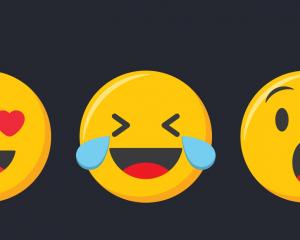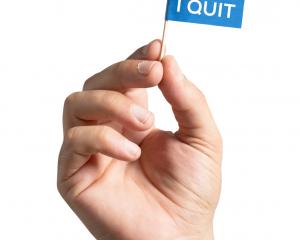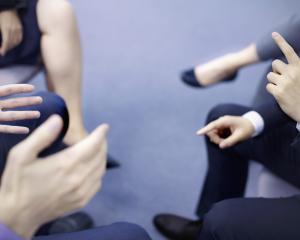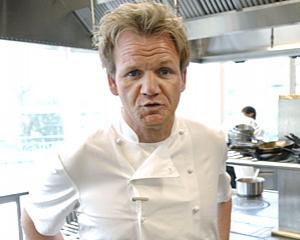Since the first lockdown in March 2020, Kiwis have been encouraged to "be kind" to each other so we can get through the Covid pandemic.
It seems that this is becoming increasingly difficult as divisions in our society grow. Back in October 2021 when vaccine mandates were being rolled out, I wrote about how to handle conversations with people who have very different views from you (refer to "Handling vexing vax discussions").
Since then, we have gone from a strategy of "let’s eliminate Covid" to "let’s live with it".
The transition has been fraught. The Covid-zero approach was clear and simple. It was heavily managed by central government and communicated everywhere — on television, social media, even on shop windows.
Moving through to phase three of the traffic light system has been swift and suddenly left us to self-manage.
We have to think for ourselves again, rely on our own values and integrity. The Mind and Mood of New Zealanders: The Arrival of Omicron report asked 1004 adult New Zealanders last month about the traffic light system.
About 51% believed the restrictions were well balanced between controlling the current outbreak and allowing ordinary life to continue. The other half was divided between 26% feeling there should be fewer restrictions and 24% believing there should be more.
People are becoming more divided and stronger in their views.
It is harder to know where to get information that you can trust.
Do you listen to a state-employed specialist in epidemiology? A well-travelled, pragmatic businessman? Or a protester committed to persevering outside Parliament?
What is "fake news"? When presented with counterarguments to our strongly held views, we can be defensive. It is easier for us to accept information that supports our preconceived ideas and ignore information to the contrary.
When faced with uncertainty, we are more open to what suits our own bias. We think less critically and want to persuade others more so they agree with us. So we "bull-s..." (or "BS").
As we return to our daily lives, we need to think about how we can get past our differences.
"There are no facts, only interpretations" said the philosopher Nietzsche. He believed that the truth was a matter of manipulating others into sharing our beliefs rather than getting those beliefs to meet reality.
But if we can think critically and identify what information is BS and what is not, we will at least be coming from a concrete base to support and explain our views to others.
Did you know there is academic research on the concept of BS? One of the first philosophers interested in it was Harry G. Frankfurt.
He described BS as a person hoping to persuade others, without caring whether what they say is true or not.
He thought that a liar cares about the truth and tries to hide it, but a BS-er does not care if what they say is true or false. Instead, they only care whether their audience is persuaded enough to believe them.
Frankfurt believed BS-ers, and the growing acceptance of BS, are more harmful to society than liars and lying. This is because liars actively consider the truth when they hide it, while BS-ers totally ignore the truth.
They communicate to manipulate, under the guise of being truthful.
While BS may be tolerated more, that actually makes it more harmful. Especially when the BS-ers believe themselves (remember Donald Trump’s suggestion that injecting disinfectant into your veins would cure Covid)!
Because all forms of communication have increased, we are exposed to more BS.
The internet has made all information — fact and BS — accessible to more people.
This has led to an increased social expectation for us to have opinions on more topics, even though we might not know what we are talking about.
We want to appear knowledgeable, and while our BS may not be intentionally deceitful, it is still dangerous because we are normalising casually disregarding the truth. We are "massaging it" or "faking it till we make it".
Many of us think we can detect BS, so we don’t see it as all that damaging.
While casual BS, such as someone showing-off can be annoying, when it is in political propaganda or public relations, it can be highly influential.
Typically it will be full of euphemism, cliche and high-sounding abstractions.
Studies have shown that gullibility for BS depends on how extreme your political views are and the celebrity status of the communicator (Trump supporters come to mind).
Researchers led by Gordon Pennycook looked into why many people subscribe to BS. They found that such people have little willingness for, or training in, critical thinking.
Critical thinking is the ability to make informed decisions by evaluating several different sources of data.
The fundamentals are. —
Being objective: analysing a question without being influenced by your bias, emotions or assumptions.
Being observant: identifying the root cause of a problem and understanding why it may be a problem.
Being analytical: evaluating what information is relevant, accurate and independently verifiable, and asking the right questions to test it.
Being open to debate: discussing your thoughts in a calm and rational way with people who might disagree.
When presented with a question, critical thinkers don’t immediately go off and start looking for answers, or simply follow the opinion of one person. They take a step back first to collect and review as much information as possible. They test their ideas and are not afraid to be proven wrong, that is just part of the analytical process.
If you are not looking at a question from multiple perspectives, you won’t come up with the best answer.
We often use critical thinking when making business decisions — risk management, setting prices, making acquisitions are all examples.
We can also use it when deciding what we think about sensitive topics like Covid; to cut through the BS and start to respect each other’s viewpoints, and at least agree to disagree.
Above all, whenever we are having conversations (online or otherwise) with people who think differently from us, don’t forget the original message of "being kind".
- Kate Hesson is director of Hesson Consultancy Ltd.











